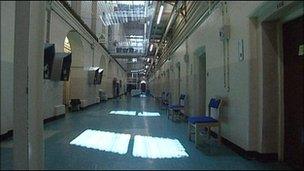Tough decisions facing NI's Prison Service
- Published

NI's prison service has been described as over staffed but under performing
David Ford has spent a lot of time talking about reform of the NI Prison Service since being appointed justice minister, today marks the start of the process of delivery.
The interim report being published by Dame Anne Owers and her review team is viewed as a road map for change that will set the direction of travel for the prison service over the next few years, with further details of the journey to follow in a final report expected to be published in June.
Dame Owers is no stranger to the Northern Ireland Prison Service.
As a former Inspector of Her Majesty's Prisons, she previously co-authored a highly critical report about Maghaberry: a report that labelled the prison as one of the most expensive, but worst-performing in the UK.
She is familiar with the many faults that have been identified within the prison service in NI. in a series of inspection reports in recent years.
The issues covered will come as no surprise as they have been highlighted in many of those other reports, most recently by Criminal Justice Inspection (CJI) in December, which will be drawn on extensively by the Owers team.
Redundancies
The report, which will be published by David Ford in the Assembly around noon, will cover a wide ranger of issues, from the cost of the prison service to rehabilitation and resettlement of prisoners, initiatives to reduce re-offending, and possible alternatives to sending people to prison.
But most attention is likely to focus on what it says about costs and possible redundancies in a prison service that has been described as over-staffed but under-performing.
The CJI report in December revealed that there are almost 1,900 uniformed officers and 400 support staff to supervise fewer than 1,500 prisoners.
The annual cost of £95,000 per prisoner, is much higher than the rest of the UK.
Dame Anne Owers is ideally placed to make a comparative analysis between Northern Ireland and prison services elsewhere.
David Ford has already said publicly that redundancies will be part of a reform process and Colin McConnell, the recently appointed director general of the prison service, has spoken of the need for streamlining.
Prison officers will listen carefully to what is said today.
Affordable
There is a long-standing expectation among prison officers that there will be a redundancy package, but the justice minister has made it clear that there won't be a Patten-style process because the money simply is not there.
The challenge for David Ford will be to come up with a package that is affordable for his department, but sufficiently attractive for prison officers.
Their union, the Prison Officers Association (POA), is very powerful, and has been characterised in a number of inspection reports as an obstacle to change.
It will mount a strong rearguard action if it believes any suggested cuts go too far.
The politics of the Assembly could then cause problems for the minister, with Sinn Fein and the SDLP backing job cuts and reform, and the DUP and Ulster Unionists likely to endorse whatever position is adopted by the POA.
Dame Anne Owers will today set the direction of travel, but David Ford is likely to encounter diversions and obstacles en route to the final destination.